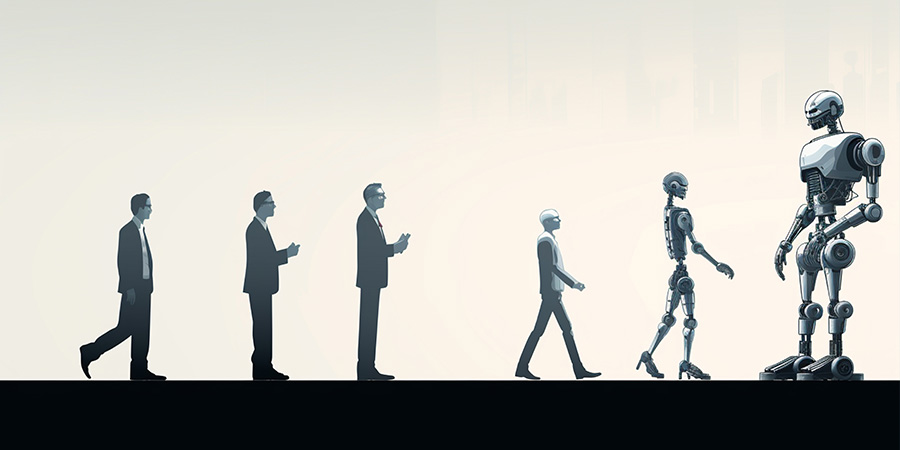The Industrial Revolution saw a dramatic advancement of technology, but that development has been left way behind by the speed and spread of the Information Revolution.
Especially since the second World War, the advancement of information and communication technologies has transformed human society like nothing before. The converge of computers, telephony and television have combined to impact business, politics and socio-cultural mores.
Every field of human development has witnessed a transformation. At the individual level, it has completely changed the way we communicate with each other. Our relationships are now social networks completely unrecognizable from 20 years ago. From landline telephone sets at home and later handheld phones the size of bricks to the slick, small smart phone these days, technology has changed not only the way we communicate but also what we communicate.
We not only talk to people across the world but we can also communicate face to face at the same time while accessing their pictures and videos in small pocket devices so popular these days. The development of information and communication, technologies have made life BG (before Google) unimaginable.
Technology growth has enabled us to access information on anything, from anywhere at any time. Armed with a smart phone and high speed internet, today’s student and professionals have any information they need at their fingertips. From 1000 internet users in 1984 to a million in 1992 over 1 billion in 2008, and now over 2 billion in 2012, the internet has grown exponentially. The spread of the Net slowed temporarily because of the digital divide, and the problems of affordability and accessibility. But net-capable smart phones have allowed us to take a leap over the divide.
The area that technology has made the most impact on is our social lives and how we interact. With Whatsapp, Skype, Viber we communicate with anyone anywhere in the world, usually for free. Google’s hangout even allows ten people to video chat free of cost. This ease of communication has in some ways brought friends and families closer than ever.
In the corporate world, products such as Dropbox and Google drive have helped keep teams in different parts of the world well as within the office, updated with documents and ongoing projects. The advent of social media from Myspace to Facebook, Twitter and YouTube has fundamentally altered human inter-relationships. From wishing birthdays to celebrating a promotion, we use social media to announce to the world every development in our lives.
It is near impossible to find someone not on some form of social media these days. One out of the 8 couples in the US met online, and that number will grow as more and more people log on. We don’t have to wait to meet someone physically to get to know them or ask what they have been up to. Social networking is now the global nervous system that links individuals not just to other individuals but to the rest of the human race.
Social networking sights now have huge impact on street movements and revolutions. From Syria to Iran, Twitter and Facebook sent thousands to the streets during and after the Arab Spring. Demonstrations such as Occupy Wall Street became the new way to spread the reform message for activists. Twitter may still not be the primary source of news for people around the world, but it already is for journalists who then feed and filter that information into the mainstream press. Try as they might, authoritarian governments have a hard time keeping ahead of the decentralized nature of the Net and the way it finds a way to be free.
To be sure, the internet also allows sensational and false information to be spread. Defamation and smear campaigns are easy in the anonymity of cyberspace, the Net also tends to fragment society and divides it up into thought ghettos. But social networking sites also have a self-correcting mechanism where truth ultimately triumphs over falsehood.
Activists everywhere use social media to create awareness about their causes, and allow like-minded people to join in
Closer to whom, the Occupy Baluwatar and the White Butterfly movements are great examples of what the social media can help activists achieve. Gone are the days of writing small articles in hard copy newspapers. It is not just activism; internet technology now allows social workers to reach remote areas more effectively too. In areas affected by natural hazards, social media and technology have played their part to ensure proper aid reaches where it is needed the most. Regular weather reports help farmers in remote areas to plan their activities better.
Medicine has benefitted by developments in information technology, making tele-medicine possible in remote areas of the world, including the mountains of Nepal. There are many examples of lives that have been saved because health workers can consult with experts and perform emergency surgery via video conferencing or in some cases even SMS.
The definition of literacy has now changed. It is not enough anymore to be able to read or write, the new yardstick is whether children can use search engines and navigate the Net. They access Google and Wikipedia through smart phones more than books or teachers. Technology has enabled smart classrooms which allows students from all over the world to access lectures from the best universities in the world without the need to attend physical classrooms. Online students fare better in exams and job placements than those that receive face -to-face instruction. More than 80% of employers in US now hired through social media, and a staggering 95% of those through LinkedIn.
The advantages of technological evolutions are many and show obvious benefits. Social media definitely allows us to keep in touch with our loved and not-so-loved ones with ease.
There are problems of the individual’s loss of privacy, easy access to x-rated, content, or using the Net to incite hatred, intolerance and violence. The increasing reliance on technology and social media has also led to growing incidence of identity theft and credit card fraud. The Net allows us to bypass government control on information, but even democratic states are now acting like Big Brother in monetary messages and calls of citizens.
We are at an age where technology is set to make yet another leap. GPS systems are used widely to direct people to places. It is harder than ever to get lost these days with the use of software like Google’s Earth and Street View. Google’s development of driverless car could be the answer to public transportation in the future. Motorola has developed electric tattoos and pills that can carry personal information under one’s skin.
So, what did we do BG? How did we stay in touch with other people before the days of mobile phones and Facebook, or stay abreast of world news before Twitter?
From activist and revolutionaries to the rise of hit singers like Justin Bieber and Susan Boyle social media provides the platform. In our daily lives we check the latest football or cricket scores on our phones or go straight to our camera and then Facebook on the birth of a child, to share with the world.
One of the indicators of massive use of social networking sites is that social media has unseated porn in web activity in the US. Social media is here not just to stay, but to grow and spread and change society in ways that are even more dramatic than what it has done already. What you use it for, how you use it, is all up to you.











